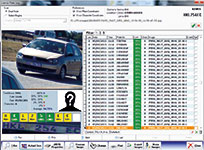

The nature and character of residential areas has changed dramatically and the way we address transport and traffic issues has become an increasingly contentious issue. Transport injuries constitute a serious public safety problem in South Africa. By lowering speed limits to 20, 30 or 40 km/h in an estate, the chances of death and serious injury are reduced when a vehicle hits a child.
The concept of ‘People First and Vehicles Second’ is a different approach in dealing with the safety of road users, specifically the vulnerable road users in residential streets and the negative impact of vehicular traffic. The statement of “people first” also includes the person driving the motor vehicle, the chances of survival increase for the driver the slower the vehicle is going when an accident occurs.
Excessive extraneous traffic, speeding, high accident rates, reckless driver behaviour and the safety of vulnerable road users, i.e. scholars and the elderly, are common concerns in residential areas. The deaths in this vulnerable age group occurs 80% of the time within 500 m of their homes. They were either playing in the streets or were on their way to school or returning from schools. They are in most cases not supervised by an adult and have to use their knowledge and skills to negotiate the complexities of their local environment.
The approach of ‘People First – Vehicles Second’ will impact on:
• How the environment will be prioritised and used,
• The standards you will apply,
• The access and mobility of vehicular traffic,
• Safety criteria,
• Level of enforcement,
• Ownership of residents, and
• Education.

Estate road rules
Inappropriate high speeds and driver behaviour can be fully addressed by estate enforcement with this proposal. Application of the proposed traffic calming measures is suitable to higher order urban roads or even rural roads, not just township and residential roads.
The required change in driver behaviour is not achieved by warnings or fines issued, but by drivers paying the fine. The ability to use the HOA rules and regulations to ensure payment is key to changing driver behaviour.
The cameras on an estate can monitor every vehicle, on a 24x7x365 basis. All violations (video, images and data) can be transferred to the back office for adjudication by local estate appointed staff. Once adjudicated, the violations can be legally issued by the HOA using the HOA rules and regulations.
Traffic enforcement is not limited to speed, but includes the whole range of estate rules and regulations, parking, bylaws, National Road Traffic rules and other areas of concern that exist within gated communities. The specification, supply, training, certification and support in respect of electronic enforcement technology for an Estate Speed Violation Solution is just one of the focus areas where I-Cube can assist gated estates.

Joint risk
In 2001, Barry T Fryer Dudley started the South African branch of I-Cube with the view to partnering and sharing risk with clients by introducing own funding for traffic management in gates communities. Being one of the first in the industry to adopt this strategy, clients are assured of I-Cube full support and commitment, thus committing to a long-term interest with the client.
Continuing with this vision, there is no cost to the client. No cost for the staff training, the office set up and operation, the uniforms, cameras, computers or any items required for the local, estate-based staff to operate the traffic enforcement solution. The client needs to provide a signed SLA and the number of estate rules which the project will start to enforce.
I-Cube recognises it is the client’s human capital at risk, so we recommend that you consider carefully before using the services of just any Estate Based Traffic Enforcement Partnership. There are many fly-by-nights out there but not everyone has the success rate, contacts, experience and ethical ability to offer what I-Cube can. Being in the industry for so long owes its successes to the criteria that I-Cube stands by and has adopted.
a. I-Cube always works within the law.
b. We are transparent to our client.
c. We maximise any collection potential.
I-Cube has never used unethical practices or means to recover our client’s capital. We have a full transparency policy in place as we understand and respect our client’s concerns and capital. Fundamentally the service we offer is a relationship between I-Cube and the client working together with the mindset to build local potential, secure your roads, reduce violations, change driver behaviour, recover, account for, and protect the capital of the client to the best of our ability. We, as a company, share your risk by investing time and resources in assisting you to recover your capital.
For more information contact Barry T Fryer Dudley, I-Cube, +27 (0)82 562 8225, info@i-cube.co.za, www.i-cube.co.za

© Technews Publishing (Pty) Ltd. | All Rights Reserved.